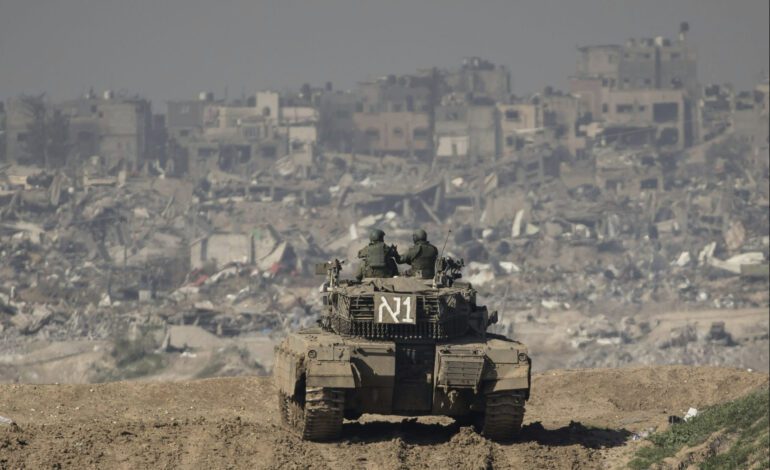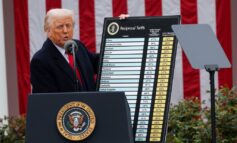The Weekly Arab Report by The Arab American News staff
From the expansion of aggression on Gaza, to blatant violations of the ceasefire agreement in Lebanon, to the breach of Syrian territory by land and air, Israeli Prime Minister Benjamin Netanyahu continued last week to stoke the flames of war in the Middle East. This comes as a transparent attempt to strengthen his grip on power within the expanding Israeli occupation state, while President Trump stands supportive in the face of Israeli brutality — despite his prior pledges to bring peace to the region, which he is expected to visit in May as part of his first foreign trip since returning to the White House.
Gaza genocide
In Gaza, the Israeli occupation army escalated its operations inside the besieged Strip. Israeli Defense Minister Israel Katz announced a major expansion of the military operation, affirming Israel’s intent to “control large areas of the Gaza Strip and annex them to Israeli security zones.” He added that there would be “widespread evacuations of residents from combat zones” — a clear sign of the Netanyahu government’s continuation of its forced displacement policy.
No humanitarian aid has entered Gaza for over a month, yet Israel insists on continuing the genocidal war until Hamas is eliminated and Israeli hostages are returned.
“This is the only way to end the war,” Katz asserted, indicating the ruling right-wing coalition’s desire to continue the “eternal war” indefinitely.
This is despite the dire humanitarian conditions faced by more than two million Palestinians. The crisis deepened last week when the Bakers Association in Gaza announced the closure of all bakeries due to the ongoing siege and the prevention of aid entry. They stated that “the closure of the remaining operational bakeries resulted from the depletion of flour, cooking gas and fuel supplies” and called on the international community to urgently deliver aid — especially flour.
A spokesperson from the Al-Aqsa Martyrs Hospital in Gaza stated that the occupation forces are preventing the entry of essential medicines for children, warning of a “health disaster if vaccinations are not allowed in.” He added that “the Strip is on the verge of a health catastrophe if the border crossings remain closed”, urging international pressure on Israel to open them.
Gazans marked their second Eid al-Fitr under the ongoing genocide that began on October 7, 2023, without any signs of joy or celebration. Eid prayers were held over the ruins of destroyed mosques, in shelters and in public squares.
Israeli airstrikes continued throughout the past week, with escalating bombardments across vast areas of the Strip, including heavy artillery shelling on neighborhoods in Gaza City and Khan Yunis in the south.
“We will work to resolve the Gaza crisis that has persisted for decades,” President Trump said regarding the stalled Gaza negotiations.
He noted the Strip has been under siege for many years and “many are being killed there.” He mentioned that he had spoken with Netanyahu, who might visit the White House next week, according to Axios, as part of efforts to secure the release of as many hostages as possible held in Gaza.
According to Axios, Israel is threatening to expand its ground operation and reoccupy most of the Strip, displacing most of its Palestinian civilians into a small so-called “humanitarian zone.”
On Monday, Israeli forces issued evacuation orders to Palestinians in Rafah, southern Gaza. Most of the city had been destroyed during previous ground operations, and many residents had not yet returned after the ceasefire.
In early March, the first phase of the ceasefire and prisoner exchange agreement between Hamas and Israel ended. The agreement, which started on January 19, was brokered by Egypt and Qatar with U.S. support. While Hamas adhered to the agreement, Netanyahu — wanted by the International Criminal Court — refused to initiate the second phase under pressure from extremists in his ruling coalition, according to Israeli media.
On March 18, Israel renounced the agreement, which had lasted 58 days, and resumed the genocide in Gaza that began in October 2023. The war has so far resulted in more than 164,000 Palestinian deaths and injuries, most of them children and women, in addition to more than 14,000 missing persons.
The Yemen front
Amid the renewed genocide in Gaza, Yemen continued to support the besieged Strip, despite escalating U.S. airstrikes last week targeting Saada, Hodeidah, Hajjah and the capital Sanaa, causing widespread destruction and dozens of casualties.
A senior U.S. military official confirmed the killing of several Houthi leaders. The White House stated that more than 100 targets were hit in Yemen, claiming initial assessments indicated “positive results.”
In direct response, the Yemeni Armed Forces declared they had targeted U.S. warships in the Red Sea, including the U.S.S. Harry S. Truman, using cruise missiles and drones. They affirmed their operations against the “American enemy” would “intensify,” aiming to stop the genocide against the Palestinian people in Gaza.
They also announced the downing of the 16th U.S. MQ-9 Reaper drone during the “Battle of the Promised Victory and Holy Jihad” in Marib province, using a locally made missile.
Despite American fleet movements and Trump’s threats of more “painful” strikes, Sanaa insisted that “these operations will not stop unless the aggression against Gaza ends and the siege is lifted”, reaffirming their commitment to resistance until these goals are achieved.
Houthi leader Abdul-Malik al-Houthi reiterated threats to target U.S. warships and warned that continued American attacks on Yemen would bring U.S. forces within his group’s range.
Israeli military assessments Monday suggested that the Houthis now possess only a few dozen ballistic missiles, and that many of their launch platforms have been damaged by American and Israeli strikes.
Since the resumption of the war on Gaza, Yemen has fired 11 ballistic missiles at Israel, in addition to dozens of drones and cruise missiles.
Internal Israeli crisis
Netanyahu is facing growing political and legal pressure domestically — ranging from the pending appointment of a new Shin Bet chief, awaiting a Supreme Court decision to dismiss current chief Ronen Bar, to escalating investigations into the “QatarGate” scandal, which implicated Netanyahu’s inner circle in receiving illicit funds from Doha. His two main advisors, Eli Feldstein and Yonatan Urich, were arrested.
Public protests demanding a prisoner exchange deal with Hamas — even at the cost of ending the war — are growing.
Analysts suggest that tensions between political, judicial and security establishments indicate further unrest in the near future. Netanyahu called the arrests and investigations into his advisors a political witch hunt aimed at toppling his government.
The QatarGate scandal has exposed chaos in decision-making and significant pressure on Netanyahu. Investigations revealed serious suspicions about illegal funds from Doha possibly being used for personal gain.
Public protests, which may intensify, raise questions about their actual influence on Netanyahu’s decisions. The ruling coalition recently suffered a setback when Finance Minister Bezalel Smotrich resigned over disputes with National Security Minister Itamar Ben Gvir regarding their agreements.
Israeli-Turkish standoff in Syria
Syria became a focus last week. After the announcement of a new government in Damascus on the eve of Eid al-Fitr, the days that followed saw intense Israeli airstrikes on Damascus, Homs, and Hama — allegedly in response to Turkish expansion in Syria. This was coupled with unprecedented ground incursions into Quneitra and Daraa, where fierce clashes broke out between local fighters and Israeli forces, hinting at emerging armed resistance.
Political analyses and statements from Israeli officials suggest that the airstrikes on the T-4 and Hama military airports were direct warnings to Turkey.
“These strikes are meant to send a message to Turkey: Don’t establish a military base in Syria or interfere with Israeli activity in its skies,” an Israeli official said, according to the Jerusalem Post.
He added that a Turkish airbase in Syria could pose a significant threat to Israel’s freedom of operations. Israeli political and security leadership has held multiple meetings to discuss concerns about Turkey’s growing role in Syria, accusing Ankara of trying to turn Syria into a “Turkish protectorate.”
Turkish media had previously reported that Ankara was planning to take control of the T-4 airbase east of Palmyra, in Homs province, to rehabilitate and expand it for military and intelligence operations.
On the ground, Israeli forces entered previously untouched areas of Mount Hermon in Syria, claiming their goal was to “seize weapons and eliminate threats” to secure the Golan Heights.
Last Thursday, Israeli aircraft dropped leaflets warning militants against any movements in Koya, rural Daraa, after residents clashed with advancing Israeli forces. The village was later heavily bombed, killing nine civilians, and causing mass displacement.
The Israeli army claimed to have killed several militants who fired on Israeli troops operating in southwest Syria after the fall of the Assad regime.
Politically, Transitional President Ahmad Al-Shara announced the names of the new Syrian government ministers, which included one Christian woman. He also appointed Sheikh Osama Al-Rifai as grand mufti and established a Fatwa Council to issue rulings on emerging matters.
Several countries welcomed the new government, including Saudi Arabia, the UAE, Jordan, Qatar, Turkey and Germany. The U.S. State Department expressed hope on Monday that the announcement marked a positive step toward a unified and representative Syria. It added that Syrian authorities must fully reject terrorism and exclude foreign terrorists from government posts.
Israeli violations of the ceasefire agreement in Lebanon reached 2,000
Israel continued its daily, escalating violations in Lebanon, blatantly disregarding the U.S.- and France-brokered ceasefire. Since the agreement, Israel has breached Lebanese sovereignty more than 2,000 times, resulting in 115 deaths and the destruction of hundreds of buildings. In contrast, Hezbollah has left the matter in the hands of the Lebanese government to deter the Israeli aggression.
Following the assassination of a resistance figure in Beirut’s southern suburbs, the internal highlight was the General Security’s announcement of arresting several suspects linked to the firing of “stray rockets” from Lebanese territory into Israel.
“All evidence suggests Hezbollah is not responsible” for the rocket fire, President Joseph Aoun said.
A security source told The Arab American News that investigations by General Security and Military Intelligence showed no Hezbollah involvement, and that the perpetrators were non-Lebanese individuals acting under “malicious plans designed to serve Israel’s interests.”
Negotiations with Iran
“Tehran does not seek nuclear weapons, but will have no choice if attacked,” Iranian Supreme Leader advisor Ali Larijani said amid indirect talks with Washington via Oman.
Amid leaked Israeli and British reports of an inevitable U.S. strike on Iran, Larijani warned that Trump would only enter war if he wanted to gamble with his army. He added that Trump’s message to the Supreme Leader used diplomatic language, but echoed his public statements.
Supreme Leader Sayyed Ali Khamenei warned of a “firm response if Iran is attacked” after Trump threatened strikes if no nuclear agreement was reached.
“We do not expect any attack, but if it happens, we will respond with a strong and severe blow,” Khamenei said.
Iranian officials shared the contents of Trump’s message to Khamenei online.
“With respect to Your Excellency and the Iranian people, I write to open new horizons for our relations, away from past decades of conflict and misunderstandings,” he wrote. “The time has come to turn the page and build mutual respect and cooperation. Today, we have a historic opportunity.
“We are ready to take a major step toward peace and lifting tensions”, proposing to lift sanctions, boost Iran’s economy and open new channels of cooperation “not only for our peoples, but for regional and global stability.”
However, Trump cautioned, “If you reject this extended hand, and if Iran chooses escalation and continued support for terrorist groups, the response will be swift and decisive.
“Peace is not weakness — it is the choice of the strong”, he concluded. “The Iranian people deserve a better future, free from isolation and hardship. If you are ready to negotiate, so are we. But if you continue to ignore the world’s demands, history will record that you missed a great opportunity.”






Leave a Reply